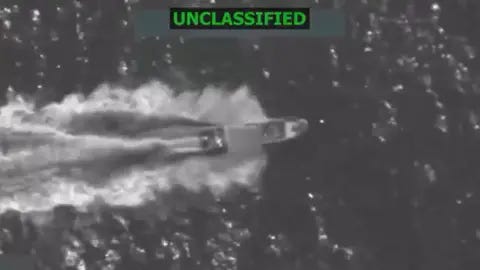10 Things Global News - 23rd October 2025
Interesting and important news from around the world
US Targets Russia’s Oil Giants With Sanctions
Putin Orders Nuclear Drills as Trump Summit Delayed
Russian Strikes Hit Ukraine In Overnight Attacks
Ukraine Pushes for Freedom Over EU Loan Use
US Expands Drug-Boat Strikes Into the Pacific
US Military Buildup Raises Venezuela Risks
Trump Eyes Deals With Xi on Trade and Nukes
Jewish Public Figures Urge Sanctions on Israel
World Court: Israel Must Allow UN Aid To Gaza
Watchdog Alleges U.S. E-Waste Floods Southeast Asia
On this day ….
On this day in 1911, Italian forces deployed aircraft for reconnaissance during the Italo-Turkish War — the first time air power was used in conflict.
What began as a rudimentary experiment soon transformed the nature of warfare, as planes evolved from observers to weapons platforms that redefined strategy and state power.
That transformation continues today: the spread of autonomous drones, precision strikes and low-cost aerial systems is rewriting the rules of battle.
Are we witnessing the next leap in military evolution where war is asymmetric and big budgets no longer guarantee battlefield success?
The United States has imposed sanctions on Rosneft and Lukoil, Russia’s two largest oil companies, marking the Trump administration’s first direct action against Moscow since returning to office.
The move aims to cut key revenues fuelling Russia’s war in Ukraine and signals growing frustration in Washington over Vladimir Putin’s refusal to end the conflict. Treasury Secretary Scott Bessent said the sanctions were designed to “degrade” the Kremlin’s war machine and warned that allies would be encouraged to follow suit.
The decision follows the cancellation of a planned Trump–Putin summit and comes as the EU prepares its 19th sanctions package, including bans on Russian LNG imports and “shadow fleet” tankers.
Crude oil prices rose more than 4% on expectations of tighter Russian supply. The measures mean all four of Russia’s largest oil firms are now under US sanctions — a sharp escalation of economic pressure after years of restraint.
Sources: The Guardian, FT
Russia has conducted large-scale nuclear force drills involving missile launches and strategic bombers, hours after the postponement of a planned summit between Presidents Vladimir Putin and Donald Trump. The exercises tested command procedures for authorising nuclear strikes and included the launch of intercontinental ballistic missiles from land and sea, as well as cruise missiles from Tu-95 bombers.
Putin said the manoeuvres were scheduled in advance, though they coincided with Trump’s decision to pause preparations for a Budapest meeting, which he said would otherwise be a “waste of time.” Both sides emphasised that any summit must be carefully prepared.
Kremlin spokesman Dmitry Peskov said neither leader wanted to meet without concrete progress, while Russian officials insisted discussions on logistics were continuing despite political friction.
Sources: The Independent, Straits Times
At least six people, including two children, were killed as Russia launched a wide drone and missile attack across Ukraine, with a kindergarten hit in Kharkiv and widespread damage in Kyiv.
Officials reported emergency power blackouts after an overnight assault targeting energy infrastructure, amid warnings that repairs would begin when conditions allowed. Ukraine’s air force said Russia fired 405 drones and 28 missiles, triggering alerts in the capital after a near two-week pause in strikes there.
Hours earlier, President Donald Trump said plans for an imminent summit with Vladimir Putin in Budapest had been shelved to avoid a “wasted meeting”. The Kremlin later said preparations were still under way, stressing that careful groundwork and an agreed date were needed.
President Volodymyr Zelensky called for greater pressure on Moscow and described a proposed freeze along current front lines as a “good compromise”, while doubting that Putin would accept it.
Sources: CBC, BBC
Ukraine has urged the European Union not to impose conditions on a proposed €140 billion “Reparations Loan” funded by frozen Russian state assets. Kyiv wants the freedom to spend the money on both reconstruction and non-European weapons, rejecting calls by some EU members to tie the funds to purchases from Europe’s defence industries.
Senior adviser Iryna Mudra said conditionality would “undermine the principle of justice”, arguing that Ukraine, as the victim, must decide its priorities.
France, Germany and Italy support a “Buy European” approach to strengthen the bloc’s defence capacity, while Nordic and Baltic states argue Kyiv must retain flexibility to buy US-made systems such as Patriots, which have been central to its air defence.
EU leaders meeting in Brussels on Thursday are expected to endorse work on a formal legal proposal, though officials acknowledge that major legal and technical questions remain unresolved.
Sources: Reuters, Politico Europe
The United States has widened its campaign of attacks on suspected drug-smuggling boats, striking vessels in the Pacific Ocean for the first time. Defence Secretary Pete Hegseth confirmed two separate strikes this week that killed five people, saying both targeted “narco-terrorists” operating in international waters.
The operations, ordered by President Trump, mark the eighth and ninth such attacks since early September, and extend a campaign that had previously focused on the Caribbean.
The White House maintains that the strikes are legal under self-defence powers, but critics argue they violate international law by targeting civilians outside armed conflict. Tensions with Colombia have escalated after President Gustavo Petro said previous strikes killed Colombians and accused Washington of murder. Trump has since cut aid to Bogotá and threatened “serious action”, while suggesting he may seek congressional approval to expand the operation to land targets.
Sources: New York Times, BBC
The United States has intensified pressure on Venezuela with a surge of warships, aircraft and troops in the Caribbean and a campaign of strikes on suspected drug-smuggling boats. Officials say the operation, launched in early September, has expanded, with at least seven boat attacks and at least 27 people reported killed as the theatre widens beyond the Caribbean. Washington has declared an “armed conflict” with groups it labels narco-terrorists and insists the strikes occur in international waters.
Alongside the deployments, President Trump has authorised covert CIA activity targeting Venezuela and said the US is prepared to “stop them by land”, a step advisers frame as limited raids rather than regime change. Elite US helicopter units have been operating near Venezuela as part of wider exercises that include heavy bombers and fighters.
Supporters cast the moves as necessary to cut drug flows; critics warn of legal and regional fallout if the campaign escalates onto Venezuelan territory.
Sources: Washington Post, The Guardian
President Trump said he expects to “make a deal” with China’s President Xi Jinping when they meet next week in South Korea, flagging possible agreements on resumed U.S. soybean purchases and limits on nuclear weapons.
He added that talks would also cover China’s purchases of Russian oil and ways to end the war in Ukraine, claiming Xi now wants the conflict to stop. The meeting is being framed as a “pull-aside”, even as Trump has promised a “pretty long meeting”.
Ahead of the encounter, Treasury Secretary Scott Bessent and Trade Representative Jamieson Greer are travelling to Asia to address Beijing’s rare-earth export curbs, which Trump called a “disturbance”, arguing tariffs are “more powerful”.
Washington has imposed additional 100% duties from 1 November and is weighing broader export restrictions if no progress is made. Trump also signalled Japan and South Korea stops during the trip and left open whether the meeting with Xi would ultimately proceed.
Sources: Reuters, JoongAng Daily
More than 450 senior Jewish figures have urged the UN and world leaders to impose sanctions on Israel, saying its conduct in Gaza and the West Bank should be held to account under international law. In an open letter, signatories argue that conditional support must end and call for compliance with rulings by international courts. They add that solidarity with Palestinians is consistent with Jewish ethical tradition and reject false accusations of antisemitism against those criticising Israel.

The letter, titled “Jews Demand Action,” asks states to avoid complicity through arms transfers and to ensure sufficient humanitarian aid reaches Gaza. It is addressed to UN Secretary-General António Guterres and global leaders, and comes as the Israel–Hamas ceasefire enters its second week. Signatories include former Knesset speaker Avraham Burg, writers and artists such as Jonathan Glazer, Ilana Glazer and Hannah Einbinder, and other public figures from multiple countries.
Sources: Arab News, Jerusalem Post
The International Court of Justice issued an advisory opinion saying Israel must ensure Gaza’s basic needs are met and support United Nations relief efforts, including UNRWA. The court said an occupying power must provide essentials such as food, water, shelter, fuel and medical services, and may not use starvation as a method of warfare. Advisory opinions are not binding, but carry legal and political weight.
The UN secretary-general welcomed the opinion and urged Israel to comply. Israel rejected the findings, saying it fully upholds international law, and argued UNRWA is linked to Hamas. The judges said Israel had not substantiated claims that a significant number of UNRWA employees were members of Hamas or other groups.
The opinion follows hearings in which UN and Palestinian representatives said aid had been blocked; although some assistance has since entered Gaza, UN officials say it remains far below needs despite a ceasefire target of 600 trucks per day.
Sources: Reuters, Al Jazeera
An environmental watchdog, Basel Action Network, says U.S. e-waste exports have surged into developing Southeast Asian countries, describing a “hidden tsunami” uncovered by a two-year investigation into at least 10 American firms.

The report estimates about 2,000 containers — roughly 33,000 metric tonnes — of used electronics leave U.S. ports each month, often via brokers that do not recycle themselves. It adds that shipments are frequently misdeclared under non-e-waste trade codes, complicating detection and oversight.
The watchdog argues much of this waste reaches informal scrapyards, where devices are dismantled or burned without protection, releasing toxic substances. It says eight of the 10 named firms hold R2V3 certifications, raising questions over safeguards.
Many consignments are destined for Malaysia — a Basel Convention signatory — despite import bans. Authorities in Thailand and Malaysia have announced seizures this year, while the U.N. has reported global e-waste hit 62 million tonnes in 2022 and is rising.














